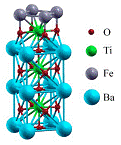Department of Physics and Astronomy: Publications and Other Research

Evgeny Tsymbal Publications
ORCID IDs
Shao http://orcid.org/0000-0002-2732-4131
Zhang http://orcid.org/0000-0001-5820-3853
Tsymbal http://orcid.org/0000-0002-6728-5480
Document Type
Article
Date of this Version
2021
Citation
Nature Communications (2021) 12: 7061
doi: 10.1038/s41467-021-26915-3
Abstract
Electric currents carrying a net spin polarization are widely used in spintronics, whereas globally spin-neutral currents are expected to play no role in spin-dependent phenomena. Here we show that, in contrast to this common expectation, spin-independent conductance in compensated antiferromagnets and normal metals can be efficiently exploited in spintronics, provided their magnetic space group symmetry supports a non-spin-degenerate Fermi surface. Due to their momentum-dependent spin polarization, such antiferromagnets can be used as active elements in antiferromagnetic tunnel junctions (AFMTJs) and produce a giant tunneling magnetoresistance (TMR) effect. Using RuO2 as a representative compensated antiferromagnet exhibiting spin-independent conductance along the [001] direction but a non-spin-degenerate Fermi surface, we design a RuO2/TiO2/RuO2 (001) AFMTJ, where a globally spin-neutral charge current is controlled by the relative orientation of the Néel vectors of the two RuO2 electrodes, resulting in the TMR effect as large as ~500%. These results are expanded to normal metals which can be used as a counter electrode in AFMTJs with a single antiferromagnetic layer or other elements in spintronic devices. Our work uncovers an unexplored potential of the materials with no global spin polarization for utilizing them in spintronics.


Comments
Copyright 2021, the authors. Open access
License: CC BY 4.0 International